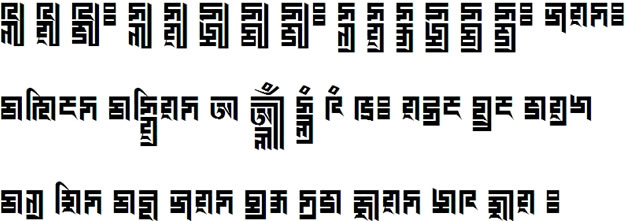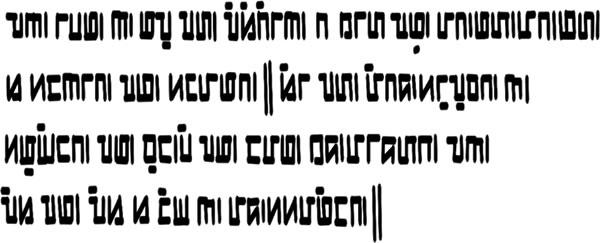Podcast: Play in new window | Download
Here’s the latest news from the world of Omniglot.
New writing system: Marchen, an abudiga that developed from the Tibetan script in about the 7th century AD and was used until the 10th century to write Zhang-Zhung, an extinct Sino-Tibetan language that was spoken mainly in western Tibet.

New writing system: Hatran, an abudiga that was used in what is now northern Iraq to write Hatran Aramaic, a Middle Aramaic dialect that was spoken in northeastern Mesopotamia from about the 3rd Century BC to the 3rd Century AD.

New constructed script: Badlit Anituun, was created by Ace Paloma as an alternative way to write Filipino.

There are new language pages about:
- Tajio, a Celebic language spoken in Central Sulawesi Province in Indonesia.
- Jemez (Cáuijògà), a Tanoan language spoken in Jemez Pueblo in Sandoval County in the north of New Mexico in the south of the USA.
There are new numbers pages in:
- Tajio, a Celebic language spoken in Central Sulawesi Province in Indonesia.
- Nagaibak, a variety of Tatar spoken in the Chelyabinsk Oblast in the southwest of the Russian Federation.
On the Omniglot blog there’s a post about Script Families, about how writing systems can be grouped into families, and the usual Language Quiz. See if you can guess what language this is:
Here’s a clue: this language is spoken in northern Sweden and northern Finland.
The mystery language in last week’s language quiz was
Futunan (Fakafutuna), a Polynesian language spoken on the islands of Funtuna and Alofi in the French territory of Wallis and Futuna in the South-West Pacific Ocean.
In this week’s Adventure in Etymology we find out what links the words Kith and Kin with words like cunning, uncouth, gnome, gentle, genius and engine.
On the Celtiadur blog there’s a new post about words for Bright Lights and related things in Celtic languages.
There’s a new Celtic Pathways podcast about words for Shamrock and Clover and related things in Celtic languages.
I also made improvements to the The Bardic Alphabet (Coelbren y Beirdd) page.
I wrote a new song this week called Upside Down which goes something like this:
What do you do when the world’s all askew
and everything’s out of its place?
Nothing is right and try as you might
You just can’t stand the pace.
Chorus
Upside-down and downside up
Back to front and front to back
Inside out and outside in
It puts you in a spin.
What do you do when your life’s in a stew
and nothing is going your way?
It’s all too much to handle or touch
And you don’t know what to say.
What do you do when you’re feeling blue
and nothing makes any sense?
Maybe a song or a smile will help
to make you feel less tense.
I’ve written a chorus in Welsh as well, but haven’t recorded it yet:
Dibyn-dobyn, dobyn dibyn
ochr chwith ac ochr faes
miga-moga, igam-ogam
Mae popeth o ei le
For more Omniglot News see:
https://www.omniglot.com/news/
https://twitter.com/Omniglossia
https://www.facebook.com/groups/omniglot/
https://www.facebook.com/Omniglot-100430558332117
You can also listen to this podcast on: Apple Podcasts, Amazon Music, Stitcher, TuneIn, Podchaser, PlayerFM or podtail.
If you would like to support this podcast, you can make a donation via PayPal or Patreon, or contribute to Omniglot in other ways.
